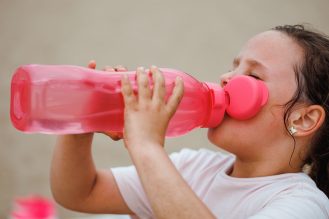Simple ways to stay cool when the weather gets too hot
Heat waves around the world are increasingly frequent, hotter, and longer-lasting, signalling a changing climate. As temperatures keep rising, we can expect more severe weather events such as wildfires, droughts, and flooding due to global warming.
Environment | June 14, 2024
Doesn’t it feel hotter? It’s important to take extra care of your health during periods of hot weather and heat waves. There are several easy strategies to help reduce your exposure to heat when the weather starts heating up. Here are some tips to consider during hot weather or heat waves.
Beat the heat: tips to keep cool
- Limit going outdoors during the hottest hours of the day (10 a.m. to 4 p.m.). Schedule strenuous outdoor work early in the day. If outdoors, stay protected in the shade as much as possible, limiting exposure to direct sunlight.
- Remember to wear sunscreen.
- Take cooling breaks where possible in air-conditioned environments, or in the shade. Reschedule heavy outdoor work. Keep yourself well hydrated.
- Use hats, light-coloured, loose-fitted clothing, and sunglasses if you are heading outdoors.
- Heat escapes through the skin, so, the more skin you can cool down, the better.
- Drink plenty of fluids, throughout the day. Opt for small drinks of fluids regularly to maintain hydration and electrolyte levels in the body.
- Eat lighter meals and choose foods with a higher water.
- Use air-conditioned public spaces like libraries, community centres and malls to escape the heat.
- Be aware of signs and symptoms of heat stroke or heat exhaustion.
- Check in on loved ones, neighbours, or friends, especially if they live alone and share these tips with them.
Home cooling tips
Here are few tips to help keep your home more comfortable during hot weather:
- Shut windows during the hottest parts of the day to keep the warmer air out.
- Keep blinds closed during the day and open windows at night to lower indoor temperatures.
- If you don’t have window coverings, try hanging up a bed sheet or towel.
- Since hot air rises, try sleeping on a lower floor in your home.
- Use fans wisely and cool only necessary rooms. Ceiling fans should be rotating in a counterclockwise direction in the summer months, to push cool air down.
- Make sure all electrical items are turned off and not in standby mode, as this still creates heat.
- Put a little water in the bathtub or a bucket and let your feet soak in it for a few minutes.
- Prepare meals during cooler parts of the day, and avoid using the oven, or consider cooking outside to avoid heating your home.
Keep pets safe
- Avoid exposing your dog’s paws to hot pavement as hot surfaces could burn their paws.
- Keep pets at home and avoid leaving them in the car as this can be dangerous and potentially life threatening.
- Offer your pet plenty of water and pay attention to their behaviour.
- If you must take your dog out for a walk, make sure to get some shade.
Heat wave safety
Keep up to date with local weather news and reporting so you can prepare for expected heat waves. Additional information on heat stress related illnesses can be found on the Peel Public Health website, under Protecting Your Health.
- Stay informed and check for weather updates and heat warnings through Environment Canada.
- Keep a home Emergency Preparedness kit current to manage heat events.
- Ensure you have enough medication on hand, as medical conditions can get worse in higher temperatures.
- Make sure you drink plenty of fluids to avoid dehydration.
- Be aware of signs and symptoms of heat-related illnesses, such as headache, dizziness and confusion, cramps in your arms, legs, and stomach or are experiencing increased heart rate or high temperature, seek medical attention if they do not improve.
- The operation of your vehicles can be affected by hot temperatures. Check your tires, fluid levels, battery, and air conditioning to ensure everything is in working order.
- Never leave children or pets in your vehicle during higher temperatures.
- For longer-term solutions, consider investing in thermal windows, external shading and additional insulation for cooling and energy efficiency.
- Plant trees and gardens around your home to naturally reduce temperatures and create shade.
By adopting these tips and strategies, you can enjoy a cooler, more comfortable summer while contributing to energy conservation and community well-being.
Please continue to monitor the City of Mississauga Newsroom for updates. Check the weather on the Weather Network or the WeatherCAN app from Environment Canada for details on weather conditions.
Stay cool and stay safe!
Tags
Media contact
City of Mississauga Media Relations
media@mississauga.ca
905-615-3200, ext. 5232
TTY: 905-896-5151


